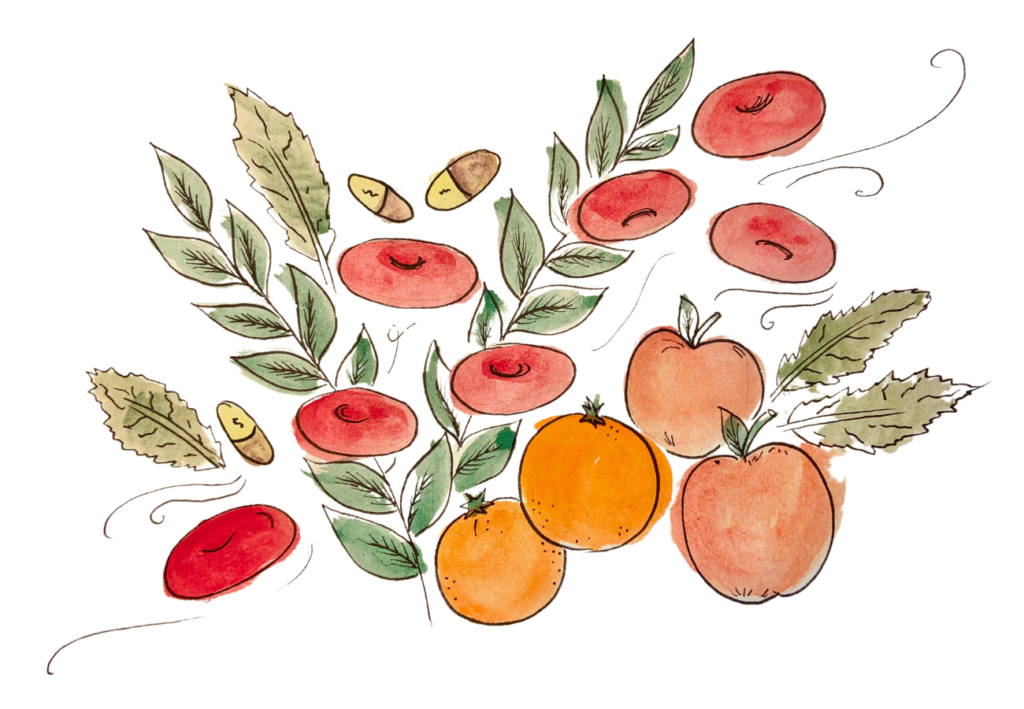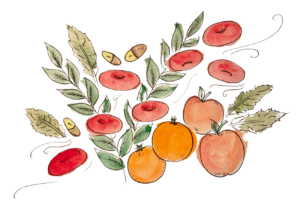
Author: Layal Bou Abdo, MSN & Emma Nassif, HBSc.
Illustrator: Emma Nassif
29/03/2023
What is anemia?
Anemia is when your blood lacks healthy red blood cells. Red blood cells are components in your blood that carries adequate oxygen around your body. Your red blood cells have a special protein inside called hemoglobin (Hgb). The Hgb carries oxygen from your lungs to tissues and organs in your body and carries carbon dioxide back to the lungs. Hemoglobin is rich in iron. It gives your blood is red colour.
Why do we people get anemia?
There are many kinds of anemia.
- When the red blood cells can’t hold their shape and break down too fast: Hemolytic anemia (Hemo=blood, lytic=breakdown).
- It is caused either when the body’s immune system destroys its own red blood cells, which is an autoimmune reaction
- Certain types of anemia can also be inherited, such as sickle cell anemia, thalassemia and G6PD deficiency.
- When the count of red blood cells is too low due to bleeding. People might bleed due to an injury, heavy menstrual cycle, or internal bleeding from a medical problem.
- When the production of the red blood cells is too slow or when this production stops. To produce hemoglobin and red blood cells, your body needs iron, vitamin B-12, folate, and other nutrients from your foods.
- Our body can stop producing red blood cells because of an infection or an illness. This condition is called aplastic anemia.
- When you are not having enough iron in your diet, you might get iron-deficiency anemia. This is the most common type of anemia.
- When you are not getting enough vitamin B12 in your diet or when your body can’t absorb the Vitamin B12, you might get anemia B12 deficiency. Vitamin B12 helps your body produce the red blood cells in your bone marrow – a spongy material found within the cavities of many of your large bones.

How does it feel when we have anemia?
Some children with anemia don’t have any symptoms, but when they do, they might feel tired, weak, or dizzy. They might also have trouble concentrating or feel like they can’t breathe. Their skin might even look pale, and their heart beats fast. Children with hemolytic anemia might have jaundice (yellow skin and eyes), and dark-coloured pee. Children with sickle cell anemia will experience pain.
How do we know if we have anemia?
We recommend visiting your doctor if you have any of the above symptoms. If you don’t have symptoms, on your yearly doctor checkup, the doctor will ask you many questions about your diet, and family history of anemia. They will perform a physical exam and perform blood tests.
How is anemia treated?
- Medication to treat an underlying disease or illness
- Supplements (vitamin B12 and iron)
- Change in diet
- Blood transfusion to treat the bleeding or a very low count of red blood cells or hemoglobin
- Hereditary hemolytic anemias don’t have a cure. However, there are lots of treatments that will decrease the symptoms. They are lifelong conditions that may require ongoing treatment.
Can we prevent anemia?
You can prevent iron and vitamin B12 deficiency anemias with a balanced diet. A balanced diet includes foods that are rich in the following vitamins and minerals:
- Iron is present in foods like red meat, offal (liver, kidney, pate), poultry, fish, shellfish, eggs, beans, lentils, tofu, dark green leafy vegetables, and dried fruit.
- Vitamin B12 is present in foods like fish, meat, poultry, eggs, dairy products, fortified cereals, and nutritional yeasts.
- Vitamin C helps your body absorb iron better. You can find vitamin C in foods like oranges, strawberries, kiwi, tomatoes, broccoli, brussels sprouts, cabbage, cauliflower, and bell peppers.
- Folate is present in fruits and fruit juices, dark green leafy vegetables, green peas, kidney beans, peanuts, and enriched grain products, such as bread, cereal, pasta, and rice.
If you’re concerned about getting enough vitamins and minerals from food, ask a nutritionist, like Nivine.
Got a question your kid wants to be answered? Let us know!
